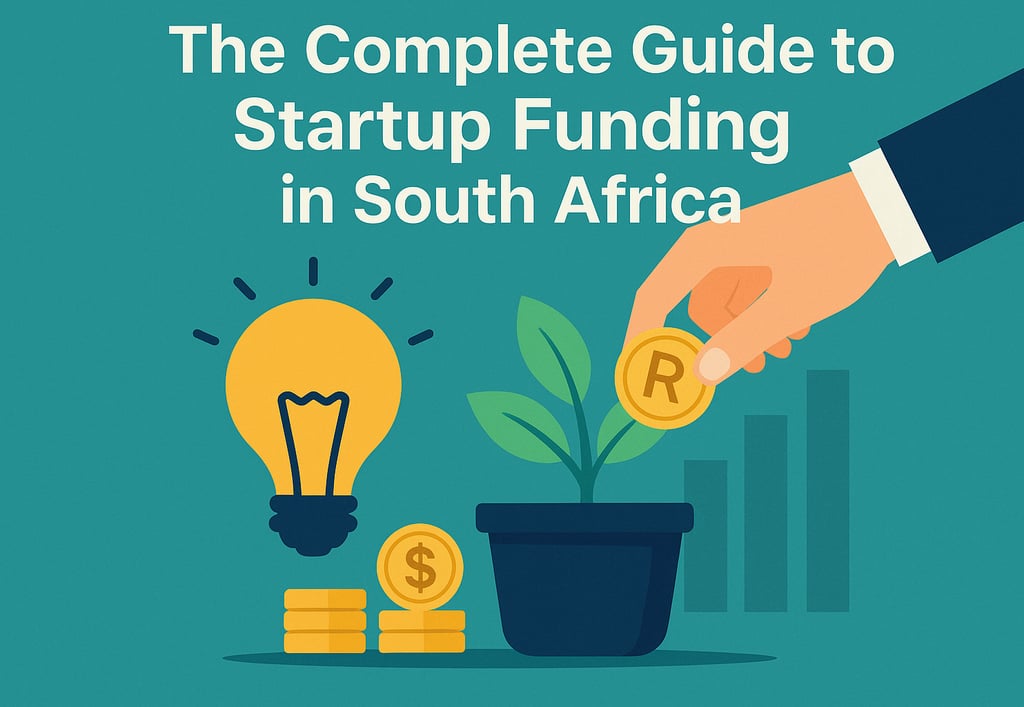Startup Funding Guide South Africa: Options & Tips
7/25/20252 min read


Launching a startup in South Africa takes more than just a great idea—it takes funding. Whether you're bootstrapping your way to profitability or looking for your first major investment, understanding the landscape of business finance is key. In this guide, we unpack the most relevant funding options for South African startups, offer practical advice, and highlight the common pitfalls to avoid.
1. Bootstrapping and Self-Funding
This is the most common starting point for South African entrepreneurs. It involves using personal savings, income from side hustles, or reinvesting early revenue.
Best For: Startups in the idea or early operational phase with minimal overheads.
Pros:
Full control over your business
No loan interest or equity dilution
Cons:
Slower growth
High personal financial risk
Tips:
Set up a lean operating model
Build a buffer for emergencies
2. Government Grants and Incentives
Government-backed funding is available for specific groups and industries. These grants do not require repayment but come with strict criteria.
Popular Grant Sources:
NYDA (Youth-owned businesses)
SEFA (Small enterprise support)
BIS (Black industrialists)
TIA (Tech and innovation-driven startups)
Pros:
No repayment required
Encourages economic development
Cons:
Long application processes
Specific eligibility criteria
Tips:
Align your business with national priorities like job creation or innovation
Prepare complete, compliant applications
3. Business Loans
Business loans offer capital in exchange for repayment with interest. Traditional banks and alternative funders have different requirements.
Types:
Bank loans (require strong financial history)
Alternative lenders (flexible repayment terms)
Personal loans (used when business credit is weak)
Best For:
Businesses with strong credit
Entrepreneurs needing capital without giving up equity
Pros:
Retain full ownership
Predictable repayment structures
Cons:
May require collateral or surety
Interest payments can strain cash flow
Tips:
Apply before you urgently need funds
Use forecasting to plan for repayments
4. Angel Investment
Angel investors are often experienced entrepreneurs or professionals who invest their own money in early-stage startups in exchange for equity.
Best For: Founders with a strong vision and early traction
Pros:
Access to mentorship and networks
Fewer formalities than VCs
Cons:
May require significant equity
Can be difficult to find the right investor match
Tips:
Pitch clearly and confidently
Use a SAFE agreement to simplify terms
5. Venture Capital
Venture capitalists fund high-growth startups in exchange for equity, with the aim of exiting profitably within 5–7 years.
Best For: Startups with scalable models and large addressable markets
Pros:
Large funding amounts
Credibility and support from experienced investors
Cons:
High pressure for rapid growth
Potential loss of control in decision-making
Tips:
Prepare a detailed pitch deck
Be ready to show how you'll achieve a 10x return
Common Mistakes to Avoid
Overvaluing your startup: Unrealistic numbers deter investors
Applying without a plan: Know exactly how funds will be used
Ignoring compliance: Ensure you meet tax, regulatory, and BEE requirements
Startup funding in South Africa is diverse and full of opportunity. By understanding your options and preparing strategically, you can secure the right funding to launch, grow, and thrive. Whether you're applying for a grant, pitching to an investor, or bootstrapping your way up, remember that the right funding choice should align with your business goals.
SA Business Funding
Empowering South African businesses with fast, flexible funding solutions since 2021.
Services
© 2025. All rights reserved.
Working Capital
Equipment Financing
Business Expansion
Apply for Funding
Company
Contact Info
Johannesburg, South Africa